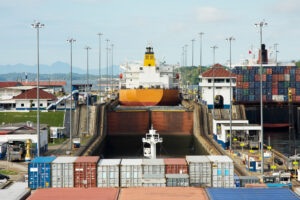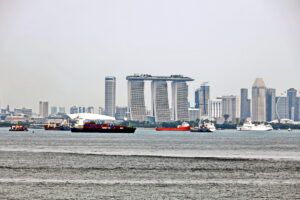The eyes of the world are on London this week and the headquarters of the IMO as representatives from around the world descend for MEPC 80.
The Marine Environment Protection Committee (MEPC) – 80th session has opened and meets in-person session at IMO Headquarters in London from 3-7 July 2023.
Amongst key agenda items, the MEPC 80 session is expected to adopt an upgraded IMO greenhouse gas strategy.
The revised IMO GHG Strategy will contain concrete greenhouse gas reduction targets for the sector and is expected to outline a basket of technical and economic measures to be developed to set global shipping on an ambitious path towards phasing out greenhouse gas emissions.
However, there is external pressure being applied to the IMO to agree targets and measures which would see maritime’s ambitions align with the 1.5 degrees limit and the wider Paris Agreement.
The early reports from the working group last week, ISWG-GHG 15, are positive. Discussions last week focused on the revised GHG strategy, on levels of ambition, candidate GHG reduction measures, follow-up actions and the next periodic review of the strategy.
The shipping industry agrees that IMO needs to align with 1.5°C goals, as they suggest anything less is not good enough.
Shaama Sandooyea, a marine biologist and climate activist from Mauritius, addressed delegates at the MEPC 80 climate summit in London on 4 July, on behalf of the Clean Shipping Coalition.
As Shaama Sandooyea said “There are only two possible outcomes from these negotiations: either member states follow the science and set a 1.5C compatible emissions pathway or you fail to do your job here. By the way, for a 66% chance of staying below 1.5C that’s a 50% cut by 2030. Anything less is not good enough. The world is watching and right now, you are on the wrong side of history.”
“The Paris Agreement came into effect 8 years ago and these negotiations around climate targets should be “kids’ play” by now. That’s how much the IMO is lagging on reality,” notes Shaama Sandooyea.
Meanwhile Andrew Sillitoe, LR’s Head of Regulatory Affairs highlighted the fact that discussions around the level of ambition, within the strategy, seemed to draw some consensus around:
- The carbon intensity reduction for 2030 being kept at 40% compared to the 2008 levels. (This is the same as initial strategy and relates to the implementation of short-term measures such as EEDI, EEXI and CII).
- The long-term GHG emissions reduction ambition of ‘net zero’ is proposed for 2050 or around mid-century, mindful of different national circumstances.
- Indicative interim checkpoints for GHG emission reduction could be introduced for 2030 and 2040 (compared to the 2008 levels) if finalised at MEPC 80. It’s possible that the 2030 checkpoint could be at least 20%, possibly striving for 25%, and the 2040 checkpoint could be 70%, possibly striving for 75%.
- Fuels and/or energy sources as well as technologies of zero or near-zero GHG emissions are to represent 5%, striving for 10%, of the energy mix used by international shipping by 2030.
- Guiding principles being kept similar to those agreed during the initial GHG strategy in 2018.
Ocean Rebellion, a group that fights to protect the high seas, held a protest demanding emissions cuts.
As Shipping Telegraph reported yesterday, Ocean Rebellion calls on IMO Member States to commit to halve ship emissions by 2030, to force ships to slow down to rapidly cut emissions, to prioritise wind power for ships, new and old, to speed up the roll-out of new climate-friendly fuels, to steeply price the carbon in shipping fuels, to scrap flags of convenience, as it is said by the group, and offer a single standard of employment rights to all seafarers, and also to make sure no-one is left behind by helping countries in need.
From his side IMO´s Secretary-General Kitack Lim during the opening of MEPC 80 mentions that the main topic at this session is the organization’s response to the global climate crisis.
“This is a historic moment in which all of you have a role to play. The 2023 IMO GHG Strategy will be your legacy, for which your children and grandchildren will be grateful. The time for IMO to demonstrate its global leadership is now,” said IMO Secretary-General Kitack Lim.



